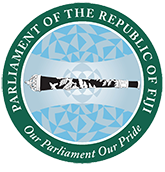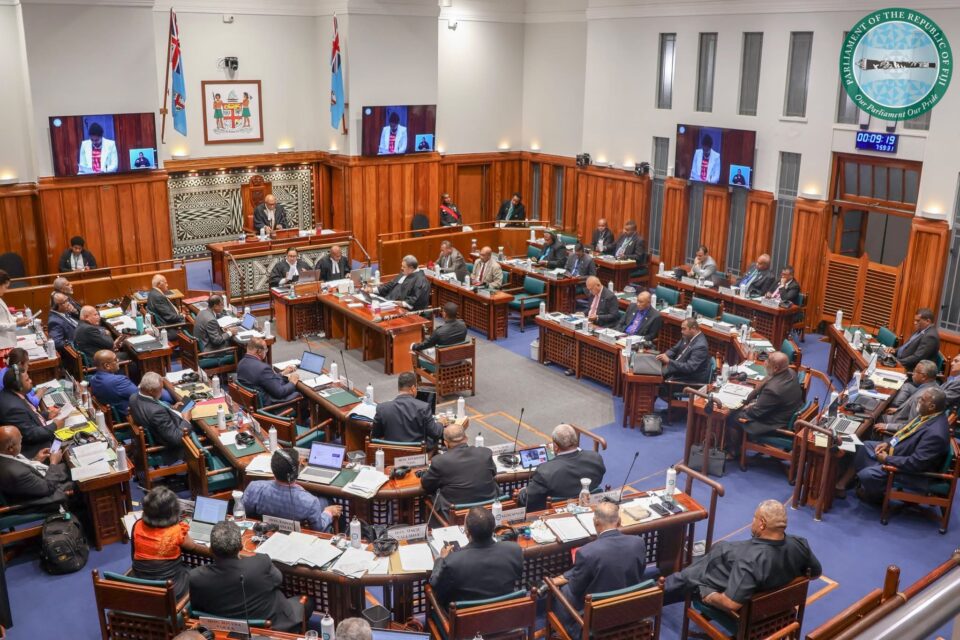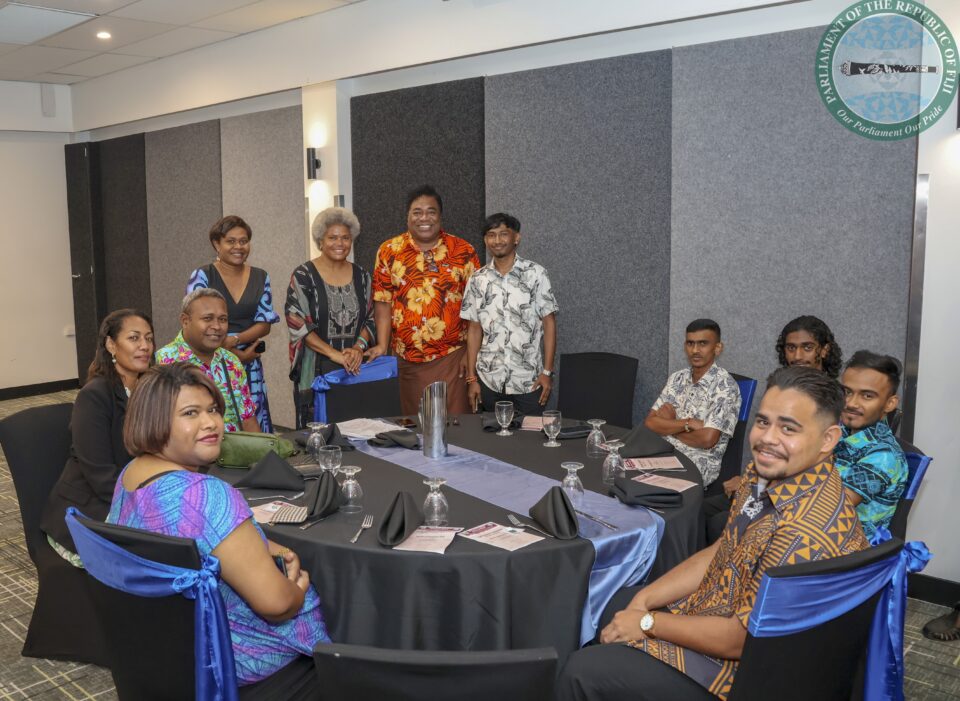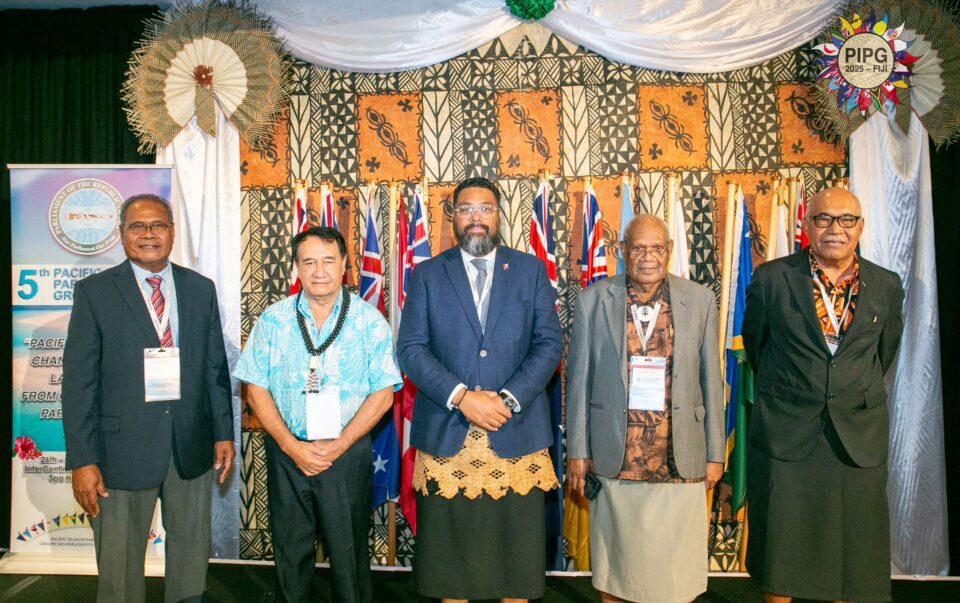His Excellency’s Address at the Opening of the 2023-2024 Session of Parliament
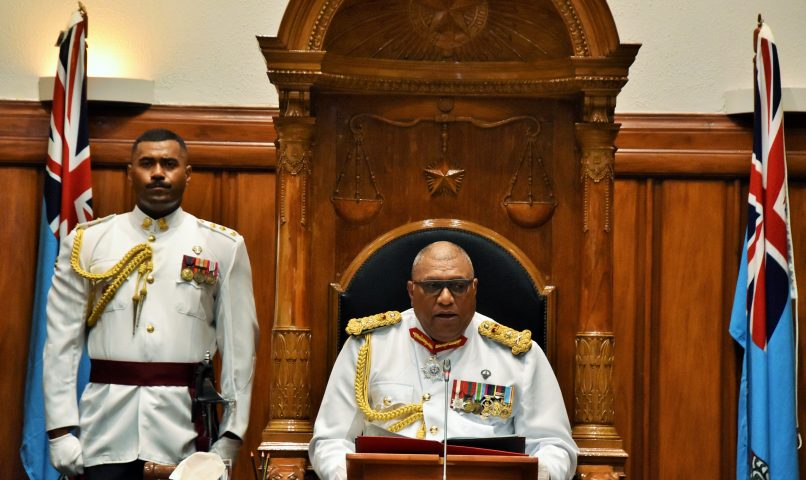
HIS EXCELLENCY RATU WILIAME MAIVALILI KATONIVERE CF, MSD
President of the Republic of Fiji
ADDRESS AT THE OPENING OF THE 2023 – 2024 SESSION OF PARLIAMENT
- Honourable Speaker of Parliament;
- The Honourable Acting Chief Justice and Honourable Members of the Judiciary;
- The Honourable Prime Minister;
- Honourable Deputy Prime Ministers;
- Honourable Cabinet Ministers and Assistant Ministers;
- Honourable Leader of the Opposition;
- Honourable Members of Parliament;
- Your Excellencies, High Commissioners, Ambassadors and Members of the Diplomatic Corps;
- Distinguished Guests;
- Ladies and Gentlemen.
Miau sa bula si’a and a very good morning to you all!
Please allow me to acknowledge and greet all our people and our friends joining us this morning via television, live streaming on the Parliament Website and Facebook page, or on the Walesi App or radio. I thank you all for your keen interest in viewing the State Opening of Parliament.
It is a privilege and great pleasure for me this morning to open the 2023-2024 Session of our Parliament.
Honourable Speaker and Honourable Members of Parliament, since November 2021 when I last addressed this August House, our nation was at the tail-end of efforts to address the global pandemic, natural disasters and a period of uncertainty, distress and loss that gripped our nation.
The past three years have indeed been a challenge for us all. As always, we have risen to the challenges and demonstrated our resilience as a nation and one people.
As we grapple with ongoing and emerging challenges, I urge this August House to embody the collective spirit of resilience and resolve of our people. This will bring hope of a promising future for the citizens of our beloved nation, which we all call home.
Now more than ever, we must be united as one nation and strengthen our resolve to work together to meet our collective challenges. We must continue to look after each other especially those less fortunate and the most vulnerable members of our society.
Last December, our nation went to the polls. Our people cast their votes exercising their civic duty and constitutional right to choose their Government.
Unfortunately, the low turnout of voters was discouraging. I hope more eligible voters will ensure they are properly registered and make time to vote. This will ensure our voices are heard by voting in the next general election in 2026.
Since the result was announced, a new Coalition Government has been sworn in, and today we gather to begin our work in earnest with the opening of this Parliamentary Session.
At this juncture, I am grateful to note that the change in government has taken place peacefully and swiftly and the new administration has commenced its work with the mandate of the people.
I must also acknowledge the contribution and achievements of the previous Government in steering the nation in the past 16 years.
On the same note, we congratulate the People’s Coalition Government; you now have the responsibility of leading our nation for the next four years.
It is my privilege and duty this morning, as your President, to announce the policies, intentions and some of the proposed legislation of the People’s Coalition Government.
We are now moving into an era of uncertainty and rapid change due to the current geopolitical environment caused by the war in Ukraine and the US-China tensions which has very much affected global trade. As a small island state, the impact of such events will be much greater on Fiji and her people.
Your Government’s mission is to build unity through social cohesion and further improve and strengthen our economy through sustainable growth with the ultimate objective of improving the lives of all the people of Fiji.
There must be a clear focus on the rule of law and democratic processes including transparency, accountability, respect for human rights and freedoms, and listening to the views of the people through genuine consultation.
The views of all members of our communities must be heard and I urge the Peoples Coalition Government to ensure all initiatives and draft legislation must undergo a thorough consultation process for better outcomes, to ensure inclusiveness and foster greater ownership.
Government must ensure that draft laws are deliberated in consultation with relevant stakeholders particularly through the Standing Committee process. Petitions must be accommodated so that the voice of the people is heard in Parliament when they seek solutions to issues that are of concern to them.
The Government must continue to adhere to the constitutional doctrine of the separation of powers as a cornerstone of our democracy, and the necessity for public servants to perform their duties independently.
Within the Civil Service there will be more human resource and institutional capacity building to improve service delivery to ordinary people and for Civil Servants to have a clear career path.
The Public Service Commission will be given greater powers within the existing constitutional framework as a central coordinating agency on all human resource matters within the Public Service.
Operating frameworks and guidelines across the Service will foster more collegiality and coordination for greater efficiency and productivity.
Decisions taken by Cabinet will be announced so that the people of Fiji are well informed of actions taken by the Coalition Government.
The Honorable Prime Minister announced earlier this week the resolution of Cabinet on decision-making processes that will be adopted to ensure transparency and accountability. An example of this is that residents of municipalities will soon have the opportunity to choose their own representatives in elections for city and town councils.
Democracy will be broadened and localised further with the empowerment of rural communities to choose their Advisory Councillors through elections. The Councillors are a vital link in gathering data and deploying assistance to our rural communities.
On the pressing issues facing the nation, particularly on the economy, Government must recognise that the private sector, is a critical driver of economic growth. They need freedom and flexibility to pursue their aims but they must operate within the law and respect the environment. Government must put into place necessary measures so that there is a level playing field, certainty and consistency of policies that will boost confidence across the board.
The Government will work in partnership with all stakeholders (vis-a-vis the private sector, trade unions, civil society organisations and traditional institutions) in working together to grow and diversify our economy.
To do this, the Government must get its own economic house in order. By July this year, it is anticipated that our national debt will reach the F$10 billion mark. This represents approximately 85 per cent of our GDP. There is another F$1.8 billion in contingent liabilities. These are mainly in the form of loan guarantees, some of which are expected to be called up. This amounts to around 15 per cent of GDP.
The debt level severely limits the Coalition Government’s capacity to borrow further for critical capital expenditure on infrastructure such as roads, ports, hospitals, water and sewerage. Our national debt also restricts Government’s ability to direct spending into key areas such as education, health and social welfare payments.
As a small island nation with a narrow resource-based economy, prone to natural disasters and geographically isolated, it is important that we must continue to take a cautious approach as we face “headwinds”. We have been reminded of these challenges on many occasions. At the same time, Government must foster and strengthen bilateral and multilateral relations with our close neighbours to attract much needed development assistance and trade access.
In its first month in office, the Government has been responding to urgent demands while assessing the state of our finances, and re-prioritising and re-deploying funds for urgent and critical needs.
It will be necessary over the next few months to embark on a comprehensive financial review. The focus will be on consolidating government finance to improve revenues, and reducing waste, and mismanagement in expenditure so that the limited resources can be directed to priority areas.
Government will also concentrate on building confidence and trust with businesses and investors, with regards to future policy and legislative initiatives and incentives.
Consultation and collaboration on socio-economic issues facing the nation is essential. Shortly the Government will announce the appointment of a Fiscal Review Committee. The committee will, as in the past, examine the overall setting of fiscal policy, revenue-raising and expenditures. The Committee will identify strategies consistent with best practices to ensure Government’s fiscal sustainability. It will consult widely and is expected to report back in mid-May. Its members will also participate in the proposed National Economic Summit scheduled to take place towards the end of April.
The Summit is intended to be an inclusive one, bringing together a wide cross-section of our community and organisations to help shape the way forward for the country in the next four years and assist in the formulation of our National Budget. It will also contribute to an economic policy framework to support sustainable growth in the short and medium-term.
The Government cannot manage its finances without good measuring tools and personnel committed to long-term objectives. The re-establishment of the Ministry of Strategic Planning, National Development and Statistics will be given priority to ensure better coordination and formulation of a strategic and robust development agenda.
The Bureau of Statistics will be strengthened. It will operate independently, providing reliable and timely data for public information and use.
In the context of short-term economic outcomes, the Government realises that supporting tourism is critical. It has made a strong recovery since the easing of the COVID-19 pandemic, but has not yet returned to pre-pandemic levels. Traditional markets such as Australia and New Zealand remain important. Fiji Airways, our national airline, which carries 70 per cent of passengers to Fiji, is expanding its global network by investing in new routes such as direct flights to Vancouver. The resumption of direct flights between Nadi and Narita in the near future will improve visitor arrivals and trade with Japan.
The Ministry of Finance will be working closely with the Ministry of Trade, Commerce, MSMEs and Cooperatives to improve the ease of doing business for local and overseas investors alike.
Government will ensure policy transparency to build investor confidence. The objective is to create a more attractive environment for commerce and industry generally, and new investors in particular. Bottlenecks in the administrative system that caters to potential investors will be removed. So will unnecessary red-tape.
The government will also have a very clear direction in diversifying the economy, thus reducing our dependency on a narrow market base and address our vulnerability both to natural disasters and international shocks.
Trade policy will aim to enhance diversification by increasing new products and markets. To do this will require building competitive advantages through incentives and other initiatives to bring new products to the market.
The important role in economic recovery of micro, small and medium enterprises (MSMEs) is also recognised. They can serve the local and export trade. Advisory and development services will be made available. The MSME Bill to serve the needs of this sector will be finalised.
New efforts will be directed in revitalising the co-operatives movement. The Cooperatives Act will be reformed and updated for better organisation and outcomes. New support programmes will be considered for women, youth and people with disabilities.
There are renewed efforts to revive the sugar industry which provides a livelihood for a fair share of our population, particularly farmers and landowners.
Plans are currently being formulated to increase cane planting, production and harvesting, with improved mechanisation. Government will establish a Special Parliamentary Committee on the Sugar Sector to set clear and tangible strategies and targets. Farmers and landowners will be brought back into the organisational structure of the industry.
Government must respect the human rights of every person in Fiji as guaranteed in the Constitution of the Republic of Fiji 2013, as well as the rights of all communities in Fiji.
We must also continue to recognise the rights of the first peoples of this nation or the iTaukei and the people of Rotuma, as guaranteed in international agreements like the International Labour Organisation Convention No. 169 on the Rights of Indigenous and Tribal Peoples, as well as the United Nations Declaration on the Rights of Indigenous Peoples.
Indigenous Rights are a category of human rights, similar to women’s rights, the rights of the disabled and the rights of children. In recognising these rights, Government does not seek to place indigenous rights above the rights of members of our minority ethnic communities, given the indivisibility and equality of human rights.
The Great Council of Chiefs, traditionally the apex of the Vanua, is to be re-established. Its first meeting will take place in late May. The Government will undertake consultations and preparatory work before bringing the relevant Bills to this House.
I am reminded of the words of the late Justice Jai Ram Reddy, who addressed the Council of Chiefs in 1997, as the Leader of Opposition. He asked the Chiefs to consider themselves leaders not just of the iTaukei, but of all of Fiji’s people. He reminded them that Indo-Fijians did not wish to separate themselves from their iTaukei brothers and sisters. And, speaking for the Indo-Fijian community, he told the Chiefs, and I quote:
“Fiji is our home. Fiji is our only home. We have no other. We want no other”. End quote
The principal iTaukei statutes will be reviewed. These include the iTaukei Affairs Act, the iTaukei Lands Act, the iTaukei Land Trust Act, the iTaukei Trust Fund Act, and the iTaukei Development Fund Act. This will position the relevant institutions to deliver their mandates efficiently and effectively.
The iTaukei institutions will be reviewed. Institutions such as the iTaukei Affairs Board, and Provincial, Tikina and Village Councils will be strengthened. The iTaukei Lands and Fisheries Commission, the iTaukei Land Trust Board, the iTaukei Trust Fund Board, and the Centre for Appropriate Technology and Development will also be reviewed. Again, the aim is to enable effective service delivery consistent with the Government’s mandate in accordance with the universal standards of the UN Declaration on the Rights of Indigenous Peoples and the ILO Convention 169 on the Rights of Indigenous and Tribal Peoples.
A prime objective is to improve the economic position of the iTaukei and lift living standards of villages and settlements. The Government recognises that it is in the national interest for the iTaukei to increase their involvement in commerce.
To help achieve this, an inaugural iTaukei Resource Owners Forum will bring together resource owners and advisors with the necessary expertise to develop a roadmap for moving forward. This is an example of the inclusive approach that Government will continue to embrace.
On the health sector, the Government is drafting plans for the revival of medical and hospital services by improving and maintaining facilities, services, skills training and patient care. Functional Divisional Command Centres will strengthen service delivery and coordination of grass-roots health programmes. Emphasis will be given to better access to electricity, connectivity and water.
Community engagement and ownership are seen as key to attaining better health service coverage. There will be particular emphasis on improving services at divisional and sub-divisional hospitals.
Effectively managing the diabetes crisis is a priority for the Government, as well as dealing with the prevalence of other non-communicable diseases. These ailments account for 85 per cent of all deaths in Fiji.
The education system will be directed towards achieving the sustainable development goals – and for our children and tertiary students to reach their full potential. The recent Back to School support programme underscored the Government’s commitment to helping families with education costs.
A major undertaking is the establishment of an Education Commission to review the entire education system in the country and make recommendations for improvement in the quality of teaching and leadership of our school system, and the curriculum to meet the needs of the labour market.
Government will then convene an Education Summit, bringing together all stakeholders to consider the recommendations of the Education Commission and formulate a national education policy.
The Government is moving to rebuild Fiji’s relationship with the University of the South Pacific while maintaining synergy with the University of Fiji and the Fiji National University in meeting labour market demands.
Policies for the ongoing development of young people and sport are central to the overall wellbeing of the nation.
The Government is committed to ensure that youth have access to knowledge, skills and training, so that they can effectively participate and contribute to nation-building.
Enhancement of sport facilities will attract more international sporting events and tournaments to our shores positioning Fiji as the Pacific’s sporting hub.
The revival of the Rural and Outer Island Development Programme will boost socio-economic development in our rural setting. The programme will be directed at income generating projects, improved infrastructure, and better services including affordable, cyclone resistant housing; power and water supplies; sanitation systems and sustainable livelihoods.
There will be improved co-ordination for disaster preparedness, response, recovery operations and mitigation.
The Government will continue its efforts to end violence against women and girls, and promote women’s economic empowerment. The Government is determined that the needs and interests of women and girls will be reflected in legislation, policies and the National Budget.
There will be continuing emphasis on child protection with the ultimate objective of establishing a Department for Children.
Funding for Poverty Benefit, Social Pension and Disability schemes and the bus fare subsidy will continue. Government will adopt a new targeting strategy to ensure the most vulnerable are assisted and protected. A Poverty Monitoring Unit will monitor and report on poverty alleviation efforts in various Government agencies.
At the national level, agriculture will ensure all citizens have access to safe and nutritious food and that farmers have guaranteed incomes from both local and export markets. Inclusive agricultural policies for young people and women will be strengthened along with development of specific commodities.
Farmers will be encouraged to work in clusters to facilitate access to markets, finance, training and technology.
In March, the Government will host the Pacific Week of Agriculture. This will bring together regional agricultural leaders and experts; promote alliances, mobilise donor support and lead to joint efforts to foster food security.
The Public Works Department is to be reintroduced. Maintenance and upgrading of rural roads and river crossings will be a priority for the PWD. It will also be responsible for rural water, electrification and sanitation services.
The people are suffering due to regular power and water cuts. Government will put into place necessary measures to address these long-standing challenges.
Government will re-establish the Tripartite Forum, comprising Government, employers and trade unions. It will play a pivotal role in issues relating to employment, productivity and industrial relations. The reinstatement of tripartite wages councils to determine minimum wages for different sectors of the economy will be given priority.
Through the Vuvale partnership programme Government will work closely with the Australian Government to improve opportunities for labour mobility.
Government will ensure public enterprises follow the rules of transparency, good governance and accountability in their respective operations.
A specialist review of Fiji’s defence and security systems will be undertaken. This will include finalising the national security strategy and introduction of a related Defence Council Bill to provide the necessary legal framework. Review of defence related legislation is also a priority.
Fiji’s border security is to be enhanced and harmonised with the relevant international treaties. Government will accede to the Arms Trade Treaty and International Convention on Maritime Search and Rescue after requisite parliamentary process is undertaken. The existing national security architecture will be reinvigorated.
The Government will maintain the national focus on the critical issues of climate change and the environment. There will be emphasis on aspects where Fiji can make the most impact locally, in the region and internationally. Communities will be encouraged to work with the Government in cleaning up their local environment and surroundings.
Our foreign policy will focus on restoring confidence and unity among our Pacific Island Forum member countries and building stronger relationships with friendly countries. This is of special significance at a time of maneuvering by major powers for influence in the Pacific.
Media legislation will be reviewed to strengthen freedom of the press and the peoples’ right to information. The Government is taking a strong position on this, along with respect for civil rights and freedoms.
An announcement will be made soon of two new public holidays. This includes a public holiday to commemorate the arrival in Fiji in 1879 of the Girmitiyas whose descendants are an integral part of our nation. In addition, a national holiday marking the life and achievements of Ratu Sir Lala Sukuna will be gazetted.
In moving forward, our focus now is to build bridges and bring unity among our different communities to work together as one people and one nation.
To grow the economy, we must increase the size of the pie by diversifying our resource based sectors that give us the greatest potential and opportunities.
We must continue to improve on our infrastructure to meet the demands of a modern Fiji and our social services, particularly health and education, must continue to be improved to meet the current and future needs of the nation.
Our vulnerability to increased severity and frequency of natural disasters due to climate change cannot be ignored. We must continue to put into place mitigation and adaptation strategies with support from the international community.
The change in our government gives rise to the opportunity to bring our nation together and start afresh.
To the Honourable Speaker, Members of Cabinet, Members of the Loyal Opposition and Members of Parliament, I congratulate you on being called to serve Fiji and her people.
I urge you to deliberate with intention, advocate with thoughtfulness and inclusivity, and debate with respect and finesse, and in all that you do, deliver on your sacred duty to the people of Fiji.
It is my hope and prayer that you must all work together for the betterment of our nation, in cooperation and unity.
It has been my honour today to outline to you the plans and policies of the People’s Coalition Government.
I pray that Almighty God will Bless the Members of this August House in your preparations for debate and on what I have put before you today.
May the people of this land that we all love be the ultimate beneficiaries of your collective wisdom.
I wish you all great success for this year and it is now my duty and great honour to declare the 2023 – 2024 Parliamentary Session open.
May God Bless us all and May God Bless Fiji!
Vina’a Va’a levu be’a and Thank you very much!

